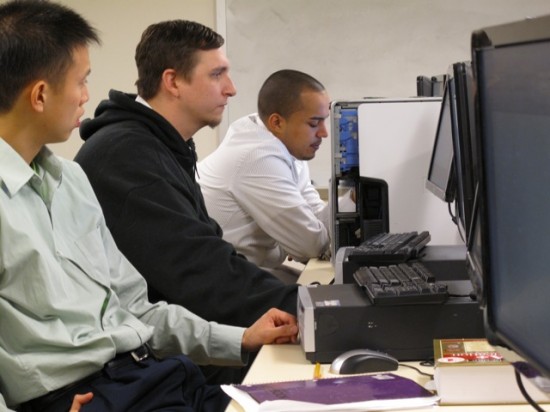
He worked in the financial sector, installing computer workstations for a big company that was acquiring smaller firms.
After President George W. Bush was inaugurated in 2001, though, background checks became tougher. And after the attack on the World Trade Center in September, still more stringent requirements made it even harder for ex-offenders to hold jobs in the financial technology industry.
Worries about security “made it difficult to get a McDonalds job, regardless of any references,” said Hopkins. “People with criminal backgrounds—they try to give you the bottom of the barrel.”
A rough time followed for Hopkins, 34, who has lived for most of the past decade in Melrose or in Harlem. He struggled to earn a stable income and spent time living in homeless shelters.
It was when he was leaving one such shelter that Hopkins heard the name “Per Scholas” from a job placement agency. That was in 2006. Now, Hopkins finds himself turning down exciting international work in favor of his steady job here in New York, so he can spend more time with his kids.
Per Scholas, a non-profit organization whose mission is “dedicated to using technology to improve the lives of people in low-income communities,” trains computer technicians, encouraging them to gain industry-standard certification when they complete a 15-week course.
Hopkins is a poster child for its success.
Founded in 1995, Per Scholas has just moved from Hunts Point to a new and much larger home on East 138th Street in Port Morris. There, near the East River on an industrial block, the school has built a gleaming new headquarters.
Rep. José Serrano and Federal Communications Commission Chairman Julius Genachowski were scheduled to tour the new facility on Feb. 8 to highlight the the educational and economic benefits it has created.
When it began, Per Scholas simply aimed to get computers into the hands of schoolchildren and teach computer literacy to a South Bronx community that was largely being left out of the technology boom.
In 1998, it began training un-employed and under-employed people to work on computers. The original school was located in Port Morris, and long-time teacher Maureen Monaghan remembers working in a small space that held only about 13 people.
As Per Scholas grew, it moved to the American Bank Note Building in Hunts Point. When it returned to Port Morris last October, it purchased its own floor of a building, giving it 16,000 square feet of space. The new Per Scholas Institute for Technology is equipped with classrooms, a library, a student lounge and offices for teachers, administrators and job coaches.
“Each new evolution has resulted in a higher quality instruction,” Monaghan boasts. “This place is just magnificent.”
“The interior is really impressive,” says Hopkins, who graduated from the institute in 2008. “It’s more inspiring than the other building.”
Per Scholas is now equipped to train 450 students per year, tuition free. The program demands 15 weeks of full-time study in computer assembly and repair, network connection and specialty areas like printer and laptop repair, and encourages students to become A+ Certified, the industry standard for computer technicians.
Gaining certification was especially helpful for Hopkins. Though he had already worked in computing when he started at Per Scholas, both he and Monaghan, the veteran instructor, agree that anyone who is dedicated can make it through the institute.
“Somebody who has no experience,” Hopkins says, “if they focus and want to learn this, they will come out with great skills.”
Dina Montes, communications director of Per Scholas, says the program is all about economic independence. “I’ve seen all types of lives,” says Montes. Many students have been unemployed for a long time, she said, while others arrive straight from high school. (A diploma or GED is required, along with math and reading entrance exams).
Still others, like Hopkins, have been incarcerated or have lived in shelters. Per Scholas uses its relationships with local community organizations to recruit.
In addition to classroom time, students work on the production floor, where Per Scholas refurbishes computers for resale, one way the organization fulfills the “green” part of its mission.
Students also receive life skills and job placement assistance. “The more you build confidence, the more you can win over in an interview,” says Monaghan.
All this has led Per Scholas to its remarkable success rate; over 80 percent of its graduates land full-time work in the New York City area, as Torrey Hopkins has.
Hopkins is now working towards a Bachelor’s degree in computer science. Recalling when his criminal conviction made finding work difficult, he said, “People look past your experience and say ‘Why don’t you take this low-paying job?’”
Per Scholas helped him break that cycle. “They gave me a great foundation in the industry,” he says. “I’m in it for life.”
